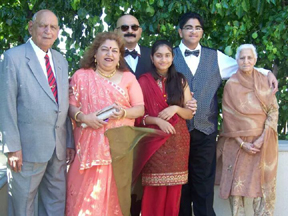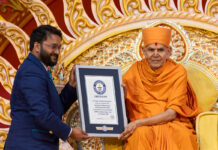 FREMONT, CA: On Saturday, March 28, Devansh Vaid, an Indian American student just completing his junior year at Deer Valley High School (DVHS) in Antioch, California, received a third-place award for a project he and a classmate submitted to the Contra Costa County Science and Engineering Fair (CCCSEF).
FREMONT, CA: On Saturday, March 28, Devansh Vaid, an Indian American student just completing his junior year at Deer Valley High School (DVHS) in Antioch, California, received a third-place award for a project he and a classmate submitted to the Contra Costa County Science and Engineering Fair (CCCSEF).
CCCSEF, in its eleventh year, is an Intel-affiliated event. Winners advance to the Intel International Science and Engineering Fair. The prestigious competition, which is the largest high school scientific research event in the world, brings together more than 1,500 students from about 70 countries and territories to compete for college scholarships, including one for $75,000.
For their science project, Devansh and his classmate undertook a study entitled, “Simple Calculus: The Transformation of an Oxymoron into a Reality.” One of 262 projects entered in the competition, Devansh and his lab partner, who are both taking AP Calculus AB this year, created a new Calculus notation for basic principles, such as limits, derivatives, and integrals that have visual connections to the logical concepts that they are taken from.
As Devansh explained, “We tackled the problem of making calculus easier, more aesthetically pleasing, and more approachable. We wanted to simplify the hardest things about Calculus and we found that it was the transition from logic to mathematics that made it so daunting. A lot of time, with traditional notation, things get lost in translation, and success is dependent on the student’s analysis of that translation rather than comprehending the problem.”
The idea for their project was born when Devansh saw how many of his classmates struggled with the Calculus course. He said, “Nobody will deny that Calculus is difficult, but I saw no reason why that great, and almost magical, thing couldn’t be simpler.”
Math League competition
The science fair award is just one in a growing list of impressive academic accomplishments for Devansh. Earlier in the year, he garnered a third-place finish in the California Math League competition. He was recently elected Vice President of the newly formed Robotics Club at his school, and is helping to write a curriculum for a new robotics class to be implemented there.
Devansh, a young man with a keen intellect and an already impressive resume, is quick to laud his parents for their support and encouragement in helping him achieve so much at such a young age. His father, Dr Pramod Vaid, is well-known in the local community as an educator and businessman, and for his work on the county library commission. His mother, Madhu Vaid, has been a teacher for 25 years.
In an interview conducted earlier this month, Devansh spoke at length about how his parents have inspired, supported, and encouraged him. Besides instilling in him a strong work ethic, Devansh said that, since he was very young, his parents gave him more advanced mathematics and English lessons before he was taught the concepts they covered in the classroom. “It paid off immensely,” he said. “I was able to skip first grade after only a few weeks. My parents’ constant push toward my academic success helped drive my sense of curiosity, and continually propelled me to new heights.”
Beyond his academic achievements, Devansh strives to put his learning to good use. Concern for others, just as it inspired his science fair project, has prompted him in other undertakings, as well. “My father grew up in Rajasthan,” said Devansh, “a state in India that is blanketed by sandy deserts and is barren, and therefore lacking in many resources.” According to the young man, this lack of resources makes life difficult for those abiding in the region.
Devansh related that his father confided in him at one point that he hoped to open a school in India for underprivileged youth when he retired. “We both saw the power of education,” he said, “and I dedicated myself to this crusade. We go to India every year and, since the ninth grade, I have been teaching children English and Mathematics in the rural areas of Rajasthan.” He added, “I also spend a lot of my free time exploring the vast and diverse nation and getting in touch with my cultural roots.”
With another year at DVHS before he graduates, Devansh plans to continue striving for excellence. “I do what I do because I love knowledge,” he said. “In the words of Talib Kweli, ‘Knowledge itself is like life after death.’ That being said, I pursue as much knowledge as I can while trying to put that knowledge to good use. In doing so, I feel that I am honoring not only that idea, but my parents, who have been such an inspiration to me.”
India Post News Service






